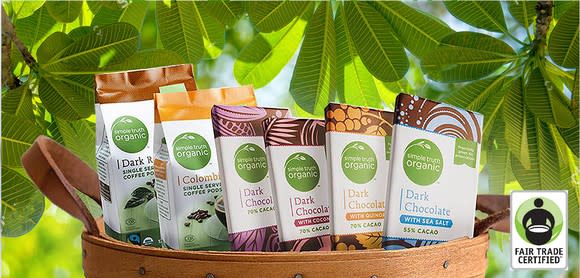Kroger Goes After Whole Foods Head-On
Back in October, I wrote how both Kroger (NYSE: KR) and Amazon (NASDAQ: AMZN), which now owns Whole Foods Market, could make for profitable investments in the grocery industry. Obviously, there was a lot of excitement about what Amazon could do to reduce costs at Whole Foods, and that excitement sent Kroger's stock down this summer -- a lot.
My belief was that the hate had gone too far, and Kroger, with its scale and Kroger Restock initiatives, would find a way to keep pace in the fragmented grocery industry, despite the new challenge.
Kroger's recent third fiscal quarter then came in positively, sending shares up from recent lows to the high 20s. But the grocery chain isn't slowing down, recently making two announcements that showed it isn't shy about going after Whole Foods head-on.
The simple truth
In a recent press release, Kroger announced that it's expanding its Simple Truth line of private-label foods, and offering an aggressive coupon campaign of up to $100 for Simple Truth products in tandem. What separates Simple Truth from other Kroger private brands is that its products are free of 101 specific artificial ingredients, GMOs, and antibiotics. In addition, Simple Truth Organic is certified by the U.S. Department of Agriculture.

Can the growth of Simple Truth rejuvenate Kroger? Image source: Kroger.
In a separate release, Kroger also said it's expanding the number of Simple Truth products labeled as "fair trade." According to Kroger, Fair trade ingredients come from farms that meet "a rigorous set of social, environmental, and economic standards." In addition, fair trade ingredients earn a premium that goes into a community bank account, which is used to fund "projects in areas like healthcare, education, water, and food security to foster advancement in the community." Kroger said it purchased 1.2 million pounds of certified fair trade ingredients in 2016.
Good for the earth, and for business
Though organic and free of preservatives, Simple Truth is also an affordably priced offering, in stark contrast to Whole Foods' "Whole Paycheck" reputation (though that may begin to change after Amazon's price cuts). Simple Truth has long been touted by Kroger management as a runaway success, going from a standing start in 2012 to over $1.5 billion in sales by 2016, and currently encompassing over 1,400 products. Last quarter, Simple Truth grew 19%, far higher than Kroger's overall 4.5% growth rate.
In addition to being lower priced, private labels are often higher margin for the retailer, since they are produced in-house. Given that, it's no wonder that Kroger aims to deploy more Simple Truth products in the months ahead.
Taking aim at Whole Foods
With the recent announcements, it's clear that Kroger is taking the fight to Whole Foods. Kroger isn't only stepping up its organic offerings, but also recently announced an initiative called "Scan, Bag, and Go," whereby customers can scan items with either a smartphone app or handheld scanner as they move through the store.
That seems to be taking a page from Amazon's Amazon Go experiment (a checkout-less grocery store), which Amazon tested a year ago in Seattle.
Close following
The big picture emerging is that Kroger is mimicking what's working at its competitors and implementing these elements into its traditional grocery store model. This is sometimes called a "close follower" business strategy, which can work for Kroger, since it already has the largest footprint and total market share outside of Wal-Mart (NYSE: WMT).
For example, not only is Kroger upping its organic and online offerings in response to Whole Foods, but it has also vowed to "never lose on price" against German discounters Aldi and Lidl. By consistently stealing the innovations of specialist competitors and plugging them into its traditional model, Kroger hopes to retain and grow customer loyalty through this industry transition. Given the stock's 40% rise from its lows this fall, it appears investors are becoming more optimistic about the strategy.
More From The Motley Fool
John Mackey, CEO of Whole Foods Market, an Amazon subsidiary, is a member of The Motley Fool's board of directors. Billy Duberstein owns shares of Amazon and Kroger. The Motley Fool owns shares of and recommends Amazon. The Motley Fool has a disclosure policy.

 Yahoo Finance
Yahoo Finance 